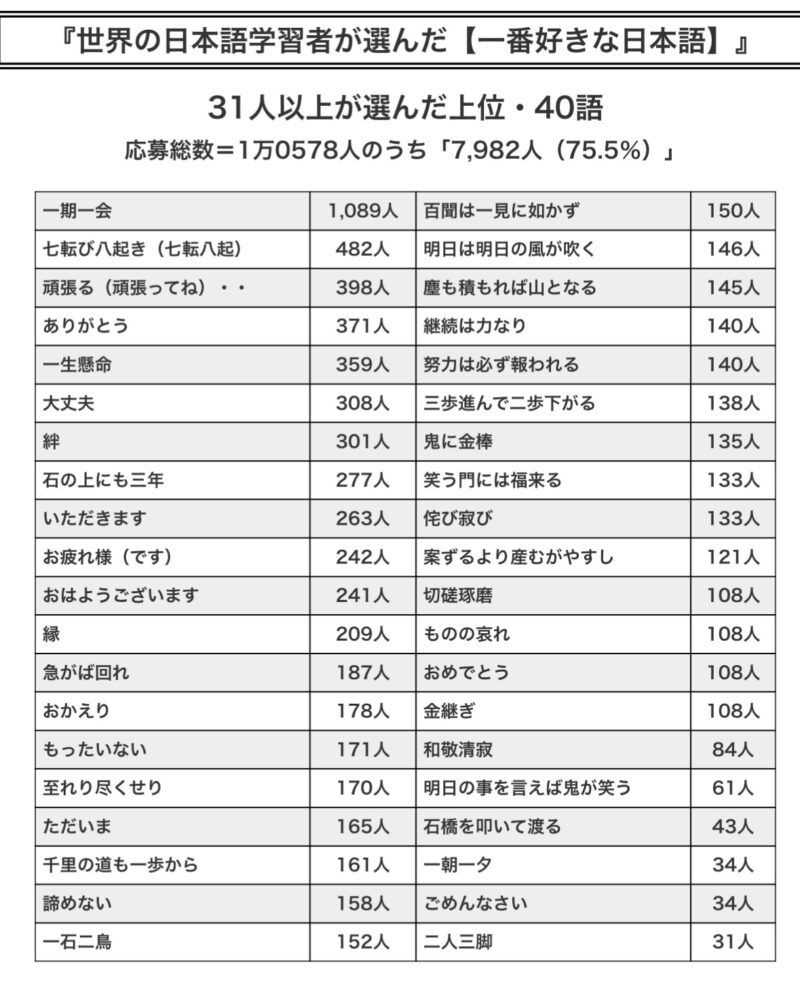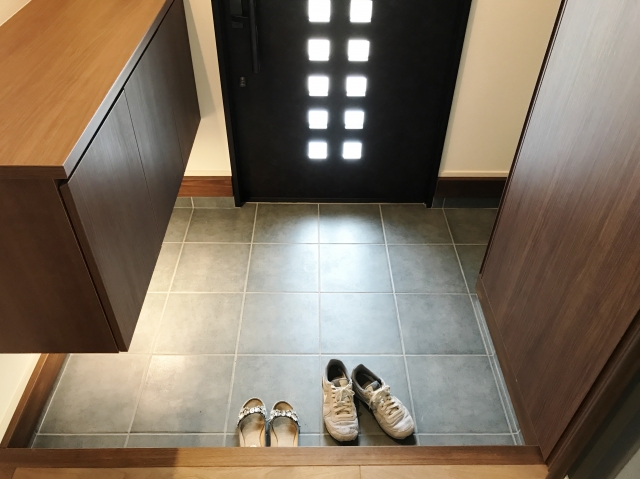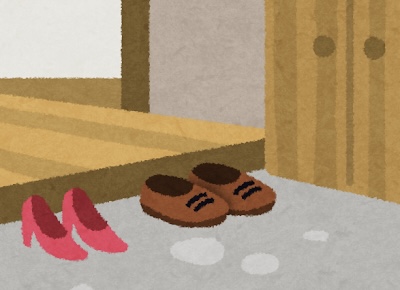The English translation is below
先日、世界の日本語学習者が選んだ【一番好きな日本語】の
ランキングが発表されました

一位はダントツの「一期一会」なんですね〜
私たちは日常生活ではほぼ使わない言葉ですけど…
それとみなさん、四字熟語やことわざが好きなんですね♪
今回は2つとも上位にランクインしている、「ただいま」と
「おかえり」のセットの言葉をピックアップしたいと思います

英語では多分、”I’m home” “welcome back “と訳されるのでしょう
ただこういうワンセットの挨拶はないとか。。。
返事があることを前提としてるので、一人暮らしの人は
言わないと思います。私も経験あるけど、帰る家があっても
待ってる人がいない訳ですから、自然と口にしなくなりました
「おかえり」「ただいま」は返してくれる人がいて
はじめて成り立つんです
だからこそ温もりを感じる、いい決まり文句だなぁと思いますね

決まり文句だからこそ、家で待つ側になると
家族の「ただいま」のトーンでその日がどんな1日だったのか
感じ取るようになります。明るい声なら安心するし
沈んだトーンなら何かあったのかな…って心配になりますよね
さらに話を聞いて欲しいのか、ほっておいて欲しいのか、
家族だからこそ、空気で分かることがあったり。
逆にですね、子供の頃外でやらかして、家に帰れば
怒られることが確定している時、親の「おかえり」の
トーンで怒りのレベルを測定していましたね(汗)
低めで不自然に冷静な声だったりすると
「うわ…今日の説教は長くなりそうだ…」と
観念したり。。。
ウチのお隣さんは、70歳前後のご夫婦なのですが
「ただいま」「おかえり」が新婚さんみたいです♪
そちらの玄関が我が家に向いているため
どうしても聞こえてしまうのですが
旦那さんが車で帰ってくると、まず玄関の前に車を止め
門を入って玄関を開け「ただいま」と言いに行きます
たまに「おかえり」の声が聞こえないことがあるらしく
ちゃんと返ってくるまで「ただいま!ただいま!」と繰り返してます
そして返事をもらったら車へ戻り、車庫に入れて家に入ります
この時点で「ただいま」って言えばよくないか〜?!
といつも思っているのですが(笑)とても微笑ましいです♪
ランキング外には「食べ放題」や「生きてるだけで丸儲け」
という言葉もありました(笑)
今後も何か気になった言葉を記事にしたいと思います♪
The other day, a ranking of “the most beloved Japanese words,” chosen by Japanese learners around the world, was announced.
In first place—by a landslide—was ichigo ichie.
It’s not something we actually use in everyday conversation, but…
It seems people really love four-character idioms and proverbs!
This time, I’d like to highlight a pair of expressions that both ranked near the top: tadaima and okaeri
In English, they’re usually translated as “I’m home” and “Welcome back.”
But there really isn’t a set pair of greetings like this.
Since these expressions assume a reply, people who live alone generally don’t use them. I’ve been there too—when no one is waiting for you at home, you naturally stop saying them.
“Tadaima” and “okaeri” only come to life when someone says them back.
Maybe that’s why they feel so warm—they’re expressions that exist because of the person who receives them.
And precisely because these phrases are so set and familiar, once you’re the one waiting at home, you start to sense what kind of day your family has had just from the tone of their “tadaima.”
A bright voice puts you at ease, while a low one makes you wonder if something happened.
And because you’re family, you can often tell—just from the atmosphere—whether they want to talk or whether they’d rather be left alone.
On the flip side, when I was a kid and had gotten myself into trouble outside, I’d gauge the level of anger waiting for me at home by the tone of my parents’ “okaeri.”
If it came in low and unnaturally calm, I knew I was in for a long lecture… and I’d just brace myself for it.
My neighbors—a couple in their early seventies—use “tadaima” and “okaeri” like newlyweds.
Their front door faces ours, so we can’t help hearing it.
When the husband comes home by car, he first parks in front of the entrance, walks through the gate, opens the front door, and says “Tadaima.”
And if he doesn’t hear his wife’s “Okaeri,” he’ll keep repeating, “Tadaima! Tadaima!” until she answers.
Only after getting her reply does he go back to the car, put it in the garage, and then finally come inside.
At that point, he could just say “tadaima” then, right?!
But honestly, it’s adorable.
Among the words that didn’t make the ranking were things like “all-you-can-eat” and even “Just being alive is a profit,” which made me laugh.
I’m hoping to keep picking out interesting expressions like these and writing about them from time to time


